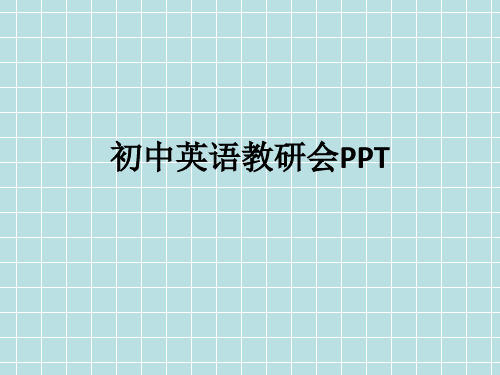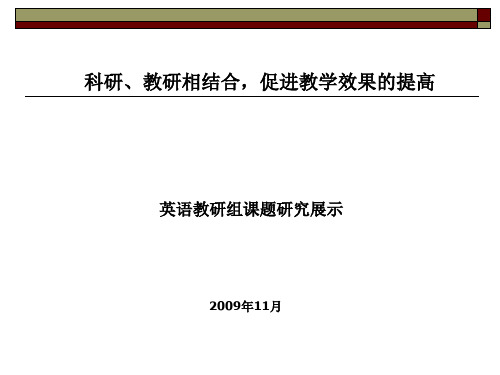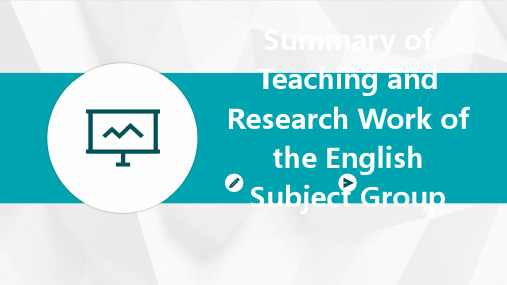英语主题教研活动分享ppt课件
【ppt 课件】小学英语教研活动二

2、5 故事教学的语言准备
选择重点词汇或句型的标准:
1)可能影响学生理解故事的词和概念或文 化背景
理解为主
2)需要处理的本单元的重点语言现象
一要理解,二要稍微体验其使用语境
关于spell:
高品质资关料 于猜词意的训练:
精心整理 . 精品课件
2、6 设计问题理解故事
• 首先:尽量不要提不用思考就能回答的问 题
高品质资料
精心整理 . 精品课件
Step 2 Talk about the pictures
• What can you see in the picture?
• Where is it ? Would you like to show us?
• It’s in the water.
• It’s on the rock.
2、4 基于故事教学的实际操作
高品质资料
精心整理 . 精品课件
Where is it?
• Words: on , under, behind, in, in front of
• Sentence: Where is it? It is ….
高品质资料
精心整理 . 精品课件
Teaching Procedure
2、基于故事的英语教学
2、6 设计问题理解故事 2、7 关于采用模仿的形式讲故事 2、8 故事教学促进学生语言能力的提升 2、9 基于故事教学中的师生互动 2、10 针对学生特点学故事
高品质资料
精心整理 . 精品课件
3、故事阅读的教学
3、1 故事阅读在英语中的作用
3、2 故事阅读教学课例及评析
3、3 故事阅读教学过程
高品质资料
精心整理 . 精品课件
英语教研培训心得体会(精选)ppt精品模板分享(带动画)

学会与家长和学生沟通,促进 家校合作
培养团队合作精神,共同成长 进步
对英语教研培训的总结和评价
收获:提高教学水平,增强英语教研能力 感受:培训内容丰富,实用性强,引发深入思考 建议:加强实践环节,增加案例分析,提高培训效果 展望:英语教研培训有助于提升英语教学质量,促进教育发展
对英语教研培训的建议和改进方向
培训的目标和意义
提高教师的英语教学能力和教研水平 促进英语教学的改革与创新 培养教师的团队合作和沟通能力 提升学生的英语素养和综合能力
培训的主要内容和课程设置
培训目标:提升学员的英语教研能力和教学水平 培训内容:涵盖了语言学、教育学、心理学等多个领域的知识 课程安排:包括理论课程和实践操作两个部分,相互结合,提高教学效果
汇报人:
目录Βιβλιοθήκη 培训的背景和目的背景:英语教研培 训是为了提高教师 的英语教学能力和 水平
目的:通过培训,教师 能够更好地理解和掌握 英语教学方法和技巧, 提高教学质量和效果
培训内容:涵盖了英 语教学的各个方面, 包括教材分析、教学 设计、教学实施和教 学评估等
培训效果:通过培训, 教师们的教学能力和水 平得到了提高,学生的 学习效果也得到了改善
Johnson, K. (2008). The role of technology in language education. Language Learning & Technology, 12(2), 10-17.
Brown, H. (2004). The use of digital technologies in language education. Language Teaching & Technology, 7(1), 5-8.
初中英语新课标,新中考(英语教研组新课标学习活动主题讲座培训课件)

• 依据:“The facts shown that students were more active after carrying out the ‘Double Reduction’ policies.” Said Fan.
the students interested in science. 85. I feel excited about the lesson.
英语教研组新课标学习活动主题讲座培训课件
第二节(书面表达)
英语教研组新课标学习活动主题讲座培训课件
英语中考的可能趋势
2023年,中考全省统一命题 听力和口语结合,人机对话
Thanks
新中考“新”在哪儿?
• 全科开考,分值和计分方式变化 • 命题形式与高考衔接 • 开放性的试题增多,越来越灵活 • 命题紧扣时代热点 • 体现中国元素和地方特色
英语教研组新课标学习活动主题讲座培训课件
新中考
一、考试题型的变化 1.听力:图片理解,六选五
英语教研组新课标学习活动主题讲座培训课件
2.阅读理解 (1)短文中填句子,考查学生的逻辑思维能 力
英语教研组新课标学习活动主题讲座培训课件
英语教研组新课标学习活动主题讲座培训课件
2022-2022第一学期九年级质量监测试题 试题的新变化
1.考查学生看的内容明显增多
英语教研组新课标学习活动主题讲座培训课件
英语教研组新课标学习活动主题讲座培训课件
推理判断题(C篇)
• What’s Fan Biao’s attitude to the “Double Reduction ” policies?
英语学习主题班会PPT幻灯片

9、字母组合变化记忆法 英语单词中以某个单词为基础,加、减、换、调一个字母就成了另一个
新单词。具体方法如下:前面加字母,例如:is-his,ear-near / hear, read-bread。后面加字母,例如:hear-heart,you-your,planeplanet。中间加字母,例如:though-through,tree-three,for-four。 减字母,例如:she-he,close-lose,start-star。换字母,例如: book-look / cook,cake-lake / wake / make / take。调字母(即改变 字母顺序),例如:blow-bowl,sing-sign,from-form。另外可以简 化单词的拼写,重新组合,有时我们需要把一个古怪而难记的单词重新 组合,简化记忆程序, 从而使它变得有趣、生动。如:把“sign”(记号) 中的“ign”变成“ing”,重新组合成“sing”(唱歌),然后用 “sing”记住“sign”;把“ear”(耳朵)中的“e”放在“ar”后, 重新组合成“are”(是),然后用“are”记住“ear”;把“leak” (泄漏)中的“e”放在“k”后,重新组合成“lake”(湖),然后 用“lake”记住“leak”。
每天进步一点点
八年级主题班会
1
考考你
全世界有两百多个国家,你知道有多少 国家是以英语为国语的吗?这对你有什么 启示?
2
在这竞争日益激烈的世界格局中,不学好英 语就像一个睁眼瞎子,不知道同学们有没 有注意不知几时起,连我们生活中所用的 感冒药都有用英语了。你说,不学好英语, 将来你还能做什么......?????
6
如何克服这些不良因素,取得成功呢?
英语教研(马中)ppt

18
方火宁, 高级教师, 上示范课。
这才是 英语教师的 范儿…
6 June 2015 Production: the star team 19
瞧,我们能大声地 读出来,milk ,milk 6 June 2015 Production: the star… team
20
想想:我决 定先问老师 ……?
Production: the star team
42
是集体智 慧开出的花朵
6 June 2015
Production: the star team
43
是岁月留下的珍贵记忆
6 June 2015 Production: the star team 44
6 June 2015
更是共同成长中的一段美好的旅程
6 June 2015
Production: the star team
针 对 问 题 再 次 走 进 课 堂
11
同科教 师在听课, 也在思考
6 June 2015 Production: the star team 12
夜幕降临, 老师们依然在 讨论,渐渐地 思路明朗开来。
6 June 2015
6 June 2015
还播撒智慧与理念
Production: the star team
31
升在 交 流 中 不 断 提
6 June 2015 Production: the star team 32
6 June 2015
Production: the star team
子 , 总时 会光 被褪 定色 格, 。外 出 学 习 的 日
集 思 广 益
6 June 2015 Production: the star team 28
英语课堂教学活动ppt课件

Sort Game
案例二: Days of the week
Chant 复习动词
案例四: Nail Soup故事教学
Bomb Game 复习食品
词汇
45
案例五:
Animals在各 年级的教学
课堂活动设计原则
年龄 特点
个体 生活实际 差异 和经验
活动的有效性
14
课堂教学需思考三点
让学生学会什么本领?
教学目标
给学生做什么事?
教学活动
学生从你的活动中获得了什么? 活动的有效性
15
年级培养目标
整册书教学目标
三
单元教学目标
维 目
标
课时教学目标
新授课 复习课 拓展课 故事课
语言知识 语言技能
16
二
课 程 目 标
情感态度
学习策略
兴自合祖国 趣信作国际 动意精意视 机志神识野
principal, professor
功能句型:-What will you be in the future? -I will
be a/an ….
拓展句型:-Where will you live in the future? -I will
live …
31
二、教学目标 - 学生能够:
借助图片、影像、听懂有关谈论未来职业及居住地 点的语言材料。
oriented) 以活动为基础(activity-based)
6
小学英语课堂的特点
课堂教学是一种动态的 教学,只有从组织课堂 活动入手,大量地进行 语言实践,使英语课堂 交际化,才能有效的培 养学生运用英语进行交 际的能力。
初中英语教研会ppt课件

• 4、在语境中练习、巩固、提高。 • 用英语做事
语法教学模式
•
•
观察→发现→ 讨论→ 归纳 → 巩固→ 运用
结束语
• 针对不同的教学目标、语法教学内容、教 学对象和教学时段,教师可采用不同的语 法教学模式和教学方法,但是核心理念是 不变的,那就是以学生的兴趣、学生的参 与及学生综合运用语言能力的发展为设计 的目标,学生不仅要掌握语言知识,更要 学会语言的实际运用。
三、教材的编排
• 传统:以语法为纲
– 语法内容按结构的难易顺序编写 – 语法讲解相对集中,难点不够分解
• 新课程:以意念功能为纲 • 更加注重了语法在实际交往中的运 用,
• 充分 体现了它的交际性。
四、中考命题的趋向
• 语法类型的试题仍然占主打地位 • 不单纯考语法,体现在语境中2008年中考基源自知识运用• • • • • •
Our classroom is cleaned every day. I am asked to study hard. A new shop was built last year. Many more trees have been planted. Knives are used for cutting things. 被动语态的结构:be+过去分词
初中一年级语法要点
• 1.人称代词、物主代词 (my,your, his, her/he she it they….) • 2. 指示代词 (this, that, these, those) • 3.方位介词(in, on, under…) • 4.一般现在时 (My favorite subject is science. I want to be an actor. I’d like some noodles.) • 5.一般疑问句:Do you have…? Do you like…? Do you want to…) • 6. 特殊疑问句(What’s your telephone number? How much…? When is your birthday?...What time….Where is your penpal from? Why do you like koalas? ) • 7.情态动词can(Can you play the guitar?)
英语教研组课题研究展示.ppt

英语教研组课题研究展示
2009年11月
一、总研究主题:
提升初中英语阅读课堂教学实效性的实践研究
1、三个备课组的子课题: 初一:初中英语阅读教学下,词汇和句型教学的研究 初二: 初三:初中英语阅读教学下课堂教学效果评价的尝试
2、课题研究的目的意义
1)从英语语言学习角度看选题的意义。 2)从课程改革目标与新课程理念角度看选题的意义。 3)从英语阅读课堂教学现状看选题的意义。
1)各备课组教师共同商讨每堂阅读课的重点词汇和句型并根据 文章特点,在学案中设计阅读环节和具体题目。
2)各备课组教师根据所设题目,每节阅读课均对各个阅读环节 设计侧重点不同具体方法: 初一:单词学习的方法,和提炼句型的技巧。加强学生的理解和 掌握。
初二:每节课前都会找不同层次学生画出当堂课的生词,然后
2、备课组活动做法
初二 1)对每堂课的重点词汇的处理结果进行追踪。通过调查问卷, 访谈等方式对学生的学习效果进行监控。
2)精心设计月考题目。平时检测题目,通过追踪学生分值变化, 检测学生学习能力。
3)精选文章,站在学生角度,带领学生体验猜词乐趣。
初三:对课堂实际效果进行追踪式访谈。
3、任课教师的落实做法
1、在学案上,每个学案的阅读课都有学生的阅读理解的侧重研究环节环节。
初一: 初二 初三 2、在作业中
3、测验中
三、研究初步效果
1、研究行为和日常教学紧密结合
初一:
初二:
初三:
2、学生英语阅读效果
初一:
初二:
初三:
3、研究得出初步结论:
初一:
初二:
初三:
四、下阶段重点研究问题和改进。
小学英语教研工作总结PPT

教师在教学过程中应注重将教材内容与实际应用相结合 ,让学生在学习过程中更好地理解和掌握知识。
加强教师培训
学校应该加强对教师的培训,提高教师的专业素养和教 学能力,让教师更好地适应现代教育的需求。
未来发展展望
多元化的教学方式
未来小学英语教研工作将更加注重多元化的教学方式,如项目式学习、合作学习等,以满 足不同学生的学习需求。
教材内容相对固定,但实际应用场景多变,需教师根据实际情况灵活
调整教学内容和方法。
03
教学手段与技术应用
传统的教学手段和方法已经不能满足现代教育的需求,需要教师积极
学习新的教学技术和手段。
对策建议
开展分层教学
根据学生的学习能力和兴趣点,将学生分成不同的层次 ,针对每个层次的学生制定不同的教学目标和方案。
小学英语教研工作总结
xx年xx月xx日
目录
• 教研背景与目标 • 教研工作内容 • 教研工作成果 • 教研工作挑战与对策 • 教研工作总结与展望 • 相关附件
01
教研背景与目标
教研背景
国家教育改革和教 育发展的需要
教师专业化发展和 教学技能提升的诉 求
提高学生英语学科 核心素养的需求
教研目标
展望未来
引言
发展方向一
发展方向二
发展方向三
在总结本次英语教研工作的基础 上,我们对未来的工作充满信心 ,相信未来会有更多的进步和发 展。
加强教育教学的理论研究。在未 来的工作中,我们将进一步加强 教育教学的理论研究,深入了解 学生的需求,探索更加科学、合 理的教学方法。
提高教师的专业素养。在未来的 工作中,我们将进一步提高教师 的专业素养,通过参加培训、交 流学习等方式,提高教师的教育 教学水平。
英语科组教研工作总结PPT

目录
• Prospects and suggestions for future work
• Appendix and Acknowledgements
01
introduction
Work Background
The English Subject Group has a long-standing history of dedicated teaching and research in the field of English language and literature.
Over the years, the group has built up a wealth of experience and expertise, making it a respected and authoritative voice in the academic community.
Job Purpose
Collaborative learning environment
Encouraging students to work together in groups and discuss ideas has fostered a supportive and motivating atmosphere, leading to improved overall performaers in the English Subject Group effectively utilize textbooks and other instructional resources to enhance their lessons and provide students with a rich and diverse learning experience. They may adapt or supplement textbook materials to better meet the needs of their students.
小学英语教研组汇报 ppt课件

ppt课件
20
ppt课件
6
(三)同伴互助,实现共同成长
• 共同制作课件 • 共同制作简单教具 • 共同开展书写、手抄报大赛
ppt课件
7
1、共同制作课件
• 我们不断学习现代教育技术,上网吸收优 秀的课件,拿到一起共同学习,采用可取 之处,并融入自己的教学思想,根据本班 的实际情况适当的加减,并能制作出自己 的课件。
ppt课件
16
四、 开展教研活动 我校重视教研组活动,为了有效开展教研 活动,每学期除了参加集体的公开课、汇 报课多种形式的活动外,我们小组还参加 市教研活动及其他的教研活动,我们小组 成员每学期听课都在16节以上。而且课后, 我们还开展评课活动,学习其它老师优秀 的地方,指出不足之处,并记录。每位老 师所带班级的成绩较上学期都有提高。
ppt课件
8
2、共同制作教具
• 上课之余,我们英 语组成员,积极用旧 硬纸盒,彩色卡纸等, 制作各种教具。
ppt课件
9
教师通过翻动各种颜色的卡 纸,进行各种颜色单词的教学。 适用范围:小学PEP教材三年级 上册 。 ppt课件
10
• 此外我们还制作了字母卡片,英语日历等一些简 单的教具,这不仅丰富了和完善了我们的教学资 源,对我们的教学也起到了有效的辅助性作用。 也大大提高了孩子们学习英语的兴趣。 • 在上学期上课时我们教具有限,老师们上课多用 多媒体课件,时间长了,孩子们积极性没那么高 了,通过本学期我们的努力,我们做了一些教具, 课堂上孩子们的兴趣明显提高很多,积极回答问 题的同学也多了起来。
共教研 同提高
--英语教研组工作汇报
卫辉市实验小学 吴志华
ppt课件
1
(一)目标明确
英语特色教研活动课件(3篇)

第1篇IntroductionThis English language teaching (ELT) research and development (R&D) activity aims to enhance the quality of English language instruction by fostering collaboration among teachers, sharing innovative teaching strategies, and exploring current trends in ELT. The activity will be conducted in a workshop format, allowing participants to engage in interactive sessions, practical activities, and reflective discussions.ObjectiveBy the end of this activity, participants will be able to:1. Understand the importance of collaborative research and development in ELT.2. Identify current trends and challenges in English language teaching.3. Develop and implement innovative teaching strategies.4. Reflect on their own teaching practices and plan for professional growth.Agenda1. Welcome and Introduction (10 minutes)- Brief overview of the workshop objectives and agenda.- Icebreaker activity: “Two Truths and a Lie” to get participants talking.2. Session 1: The Importance of Collaborative R&D in ELT (30 minutes)- Presentation on the benefits of collaborative research and development in ELT.- Case study: Analysis of a successful collaborative R&D project in a local school.- Group discussion: How can teachers contribute to collaborative R&D in their institutions?3. Session 2: Current Trends and Challenges in ELT (45 minutes)- Presentation on current trends in ELT, including technology integration, global English, and multilingualism.- Interactive activity: “Trend Matching”– Participants match current ELT trends with relevant challenges.- Group discussion: How can teachers adapt their teaching methods to address these challenges?4. Session 3: Developing Innovative Teaching Strategies (60 minutes)- Workshop activity: Participants work in groups to brainstorm and design innovative teaching strategies.- Sharing and feedback: Each group presents their strategy to therest of the participants, receiving constructive feedback.- Resource sharing: Collection of innovative teaching strategies in a shared document or digital platform.5. Session 4: Reflection and Professional Growth (30 minutes)- Individual reflection: Participants write a brief reflection on their learning from the workshop.- Group discussion: How can participants implement their new knowledge and skills in their teaching practices?- Action plan: Participants develop an individual action plan for professional growth based on the workshop content.6. Closing Remarks and Certificates (15 minutes)- Recap of the key takeaways from the workshop.- Distribution of certificates of participation.- Open forum for questions and comments.Materials- Projector and screen- Whiteboard and markers- Handouts with presentation slides and activity guidelines- Digital platform for resource sharing (e.g., Google Drive, Padlet)- Writing materials (pens, paper, etc.)Activities1. Icebreaker Activity: Two Truths and a Lie- Participants introduce themselves and share three statements about their teaching experiences. Two of the statements are true, and one is false. The group guesses which statement is the lie.2. Trend Matching- Participants are given a list of ELT trends and a list of challenges. They must match each trend with the relevant challenge.3. Workshop Activity: Developing Innovative Teaching Strategies- Groups are given a scenario or a specific teaching objective and must brainstorm and design a teaching strategy to achieve it.4. Individual Reflection- Participants write a short reflection on what they have learned, how they plan to apply it in their teaching, and any challenges they anticipate.Evaluation- Participants’ feedback on the workshop activities and resources.- Pre- and post-workshop surveys to assess the impact of the workshop on participants’ knowledge and skills.- Follow-up observations and interviews to track participants’ implementation of new strategies in their teaching practices.ConclusionThis English language teaching R&D activity is designed to provide teachers with the tools and knowledge they need to enhance their teaching practices and contribute to the continuous improvement of ELTin their institutions. By fostering collaboration, exploring current trends, and developing innovative strategies, teachers can create a more engaging and effective learning environment for their students.第2篇IntroductionWelcome to our English Language Teaching (ELT) Research and Development (R&D) activity. This session is designed to enhance our understanding of ELT practices, explore innovative teaching methods, and foster a collaborative environment among educators. Through a series of interactive workshops, discussions, and case studies, we aim to provide you with practical tools and insights to improve your teaching skills and student learning outcomes.ObjectiveBy the end of this activity, participants will be able to:1. Understand the key principles of effective ELT.2. Identify and analyze different teaching methodologies and their application in the classroom.3. Develop and implement strategies for engaging students in the learning process.4. Evaluate and reflect on their own teaching practices to enhance student learning.Agenda1. Welcome and Introduction (10 minutes)- Brief overview of the day's activities.- Introduction of facilitators and participants.2. Session 1: Theoretical Foundations of ELT (30 minutes)- Key concepts of second language acquisition (SLA).- Importance of cultural awareness in ELT.- The role of grammar, vocabulary, and pronunciation in language learning.3. Session 2: Teaching Methodologies (45 minutes)- Traditional vs. communicative approaches.- Task-based language learning (TBLT).- The use of technology in ELT.4. Interactive Workshop: Designing an Effective Lesson Plan (60 minutes)- Participants will work in groups to design a lesson plan based on a given theme or topic.- Emphasis on incorporating various teaching methodologies and activities.5. Case Study Analysis (30 minutes)- Presentation of a case study highlighting a successful ELT initiative.- Group discussion on the strategies employed and their effectiveness.6. Session 3: Student Engagement and Motivation (45 minutes)- Techniques for fostering student engagement.- Strategies for managing student motivation.- The role of feedback and assessment in student learning.7. Interactive Workshop: Role Play (60 minutes)- Participants will engage in a role-play activity to practice communication skills and address common challenges faced by teachers.8. Session 4: Reflective Practice and Professional Development (30 minutes)- Importance of reflective practice in ELT.- Strategies for ongoing professional development.- Resources and tools for teachers.9. Closing Remarks and Feedback (10 minutes)- Summary of key takeaways.- Collection of participant feedback to improve future activities.Session 1: Theoretical Foundations of ELTSlide 1: Welcome to Session 1Good morning/afternoon, everyone. Today, we will delve into the theoretical foundations of English Language Teaching (ELT). Understanding these principles will help us develop a strong foundation for our teaching practices.Slide 2: Key Concepts of Second Language Acquisition (SLA)- Acquisition vs. Learning: Language acquisition is an unconscious process, while learning involves conscious effort.- The Input Hypothesis: Learners acquire language by understanding input that is slightly above their current level of proficiency.- The Interaction Hypothesis: Interaction plays a crucial role in language learning, as it provides opportunities for feedback and correction.Slide 3: Importance of Cultural Awareness- Cultural awareness is essential for effective communication and teaching.- Understanding the cultural background of students can help us tailor our teaching methods to their needs.- We will explore cultural differences in communication styles, norms, and values.Slide 4: The Role of Grammar, Vocabulary, and Pronunciation- Grammar provides the structure for language.- Vocabulary is the building block of communication.- Pronunciation affects comprehensibility and confidence.Session 2: Teaching MethodologiesSlide 5: Traditional vs. Communicative Approaches- Traditional Approach: Focuses on grammar and vocabulary, with limited interaction.- Communicative Approach: Emphasizes communication skills, encouraging students to use the language in real-life situations.Slide 6: Task-Based Language Learning (TBLT)- TBLT involves students completing tasks that require them to use the language in a meaningful context.- Tasks are designed to be engaging, relevant, and communicative.Slide 7: The Use of Technology in ELT- Technology can enhance language learning through various tools and resources.- We will explore different technologies, such as interactive whiteboards, online platforms, and mobile apps.Interactive Workshop: Designing an Effective Lesson PlanSlide 8: Workshop OverviewIn this workshop, you will work in groups to design an effective lesson plan based on a given theme or topic. Your lesson plan should incorporate various teaching methodologies and activities.Slide 9: Group Instructions- Divide into groups of 3-4 participants.- Choose a theme or topic for your lesson plan.- Plan a lesson that incorporates different teaching methodologies and activities.- Consider the following aspects:- Introduction- Main activities- Assessment- FeedbackCase Study AnalysisSlide 10: Case Study OverviewWe will now present a case study highlighting a successful ELT initiative. Your task is to analyze the strategies employed and discuss their effectiveness.Slide 11: Case Study Details- Briefly describe the context of the case study.- Identify the teaching methodologies and strategies used.- Analyze the effectiveness of these strategies in achieving the desired learning outcomes.Session 3: Student Engagement and MotivationSlide 12: Techniques for Fostering Student Engagement- Use of real-life examples and authentic materials.- Incorporating varied activities and resources.- Encouraging student participation and collaboration.Slide 13: Strategies for Managing Student Motivation- Setting clear learning objectives and expectations.- Providing positive feedback and recognition.- Creating a supportive and inclusive learning environment.Slide 14: The Role of Feedback and Assessment in Student Learning- Feedback is crucial for guiding student learning and improving performance.- Assessment should be formative, ongoing, and student-centered.Interactive Workshop: Role PlaySlide 15: Workshop OverviewIn this role-play activity, you will practice communication skills and address common challenges faced by teachers. Your task is to:- Identify a challenge faced by a teacher.- Develop a strategy to address the challenge.- Present your strategy to the group.Session 4: Reflective Practice and Professional DevelopmentSlide 16: Importance of Reflective PracticeReflective practice involves analyzing and evaluating our teaching practices to improve student learning outcomes.Slide 17: Strategies for Ongoing Professional Development- Attend workshops, seminars, and conferences.- Join professional organizations and online communities.- Read research articles and educational resources.Slide 18: Resources and Tools for Teachers- Online platforms and apps for language learning.- Educational resources and materials.- Professional development opportunities.Closing Remarks and FeedbackSlide 19: Summary of Key Takeaways- Understanding the theoretical foundations of ELT is crucial for effective teaching.- Incorporating various teaching methodologies and activities can enhance student learning.- Reflective practice and ongoing professional development are essential for growth and improvement.Slide 20: FeedbackPlease take a few minutes to complete the feedback form provided. Your input will help us improve future activities.Thank you for participating in this English Language Teaching Research and Development activity. We hope you found it informative and engaging. Please feel free to share your thoughts and experiences with us.End of Presentation第3篇Objective:To enhance the quality of English language teaching through the exploration of innovative teaching methods, research findings, and collaborative learning among educators.Duration:1 Day (8:00 AM - 5:00 PM)Target Audience:English language teachers, educators, and researchers interested in improving their teaching practices and contributing to the field of English language education.Agenda:Session 1: Welcome and Introduction (8:00 AM - 8:30 AM)- Brief introduction to the workshop objectives and agenda.- Icebreaker activity to encourage networking and interaction among participants.Session 2: The State of English Language Teaching (8:30 AM - 9:30 AM)- Presentation on current trends and challenges in English language teaching.- Discussion on the impact of technology, globalization, and cultural diversity on language learning.Session 3: Research-Based Teaching Strategies (9:30 AM - 10:30 AM)- Overview of recent research in English language teaching.- Presentation of effective teaching strategies that have been proven to enhance student learning.- Interactive activity: Participants will brainstorm and share their own successful teaching strategies.Session 4: Technology in English Language Teaching (10:30 AM - 11:30 AM)- Introduction to various technological tools and resources that can be used in the classroom.- Demonstration of digital platforms and apps for language learning.- Small group activity: Participants will create a lesson plan incorporating technology.Session 5: Collaborative Learning and Peer Feedback (11:30 AM - 12:30 PM)- Discussion on the benefits of collaborative learning in language education.- Workshop on peer feedback techniques for professional development.- Pair activity: Participants will provide feedback on each other's lesson plans.Lunch Break (12:30 PM - 1:30 PM)Session 6: Classroom Management and Student Engagement (1:30 PM - 2:30 PM)- Strategies for effective classroom management.- Techniques to engage students in the learning process.- Role-play activity: Participants will practice classroom management scenarios.Session 7: Assessment and Evaluation in English Language Teaching (2:30 PM - 3:30 PM)- Overview of different types of assessments in language education.- Discussion on the importance of formative and summative assessment.- Small group activity: Participants will design a comprehensive assessment plan for a course.Session 8: Reflection and Sharing (3:30 PM - 4:30 PM)- Reflection on the day's activities and personal takeaways.- Sharing of best practices and innovative ideas.- Group activity: Participants will create a poster showcasing their favorite teaching strategies and resources.Session 9: Closing Remarks and Certificates (4:30 PM - 5:00 PM)- Summary of the workshop highlights.- Distribution of certificates of participation.- Open forum for questions and final thoughts.Handouts:- Workshop agenda and schedule.- List of recommended resources and technologies.- Templates for lesson plans and assessment tools.Evaluation:- Participants will complete a feedback form at the end of the workshop to assess the effectiveness of the activities and content.- Follow-up surveys may be sent out after the workshop to gather long-term feedback and track participant progress.Note:This agenda is a sample framework for an English language teaching research and development workshop. Adjustments can be made based on the specific needs and interests of the participants and the available time.。
英语研讨课件ppt

阅读材料的选取与使用
选择适合自己水平的阅读材料
01
选择难度适中的阅读材料,既能提高阅读理解能力,又能保持
阅读兴趣。
多样化阅读材料
02
阅读不同类型的文章和书籍,如新闻报道、小说、散文等,有
助于拓宽知识面和提高阅读理解能力。
利用阅读材料进行练习
03
通过完成阅读理解练习题、写读书笔记等方式,巩固和提高阅
实用性。
写作技巧与策略
构思
在动笔前进行头脑风暴,列出 要点和主要观点,构建清晰的 文章结构。
撰写初稿
根据提纲展开论述,注意保持 语言表达的流畅性和连贯性。
审题
认真分析题目要求,明确写作 目的和读者对象,制定合理的 写作计划。
草拟提纲
根据构思列出详细的提纲,包 括段落大意和过渡句等,有助 于组织文章内容。
读理解能力。
04
英语写作技能
BIG DATA EMPOWERS TO CREATE A NEW
ERA
写作基本要素
语法
掌握英语的基本语法规则,如句子结构、时态、语态等,是写作 的基础。
词汇
扩大词汇量,理解单词的准确含义和用法,能够使表达更加丰富 和准确。
标点
正确使用标点符号,如逗号、句号、分号等,以清晰地表达思想 。
跨文化交际能力的培养
提高文化敏感性和意识
了解不同文化的价值观、习俗和行为 规范,意识到文化差异的存在。
学习目的语文化
深入了解目的语国家的文化背景、历 史传统和社会习俗,提高对文化的认 知和理解。
培养跨文化沟通能力
学会尊重、适应和应对不同文化背景 的人,掌握跨文化沟通的技巧和方法 。
实践与反思
通过参与跨文化交流活动、国际合作 项目等方式,实践跨文化交际,并不 断反思和总结经验教训。
- 1、下载文档前请自行甄别文档内容的完整性,平台不提供额外的编辑、内容补充、找答案等附加服务。
- 2、"仅部分预览"的文档,不可在线预览部分如存在完整性等问题,可反馈申请退款(可完整预览的文档不适用该条件!)。
- 3、如文档侵犯您的权益,请联系客服反馈,我们会尽快为您处理(人工客服工作时间:9:00-18:30)。
11
基于“语言运用”的词汇课堂教学模式探究
——主题教研的计划与实施之“精品课堂”
基
于
一、2017-2018学年度英语教研组对高
“12 语
效词汇课堂教学模式的系列尝试
言
运 用
校级词汇公开课
” 的
区级词汇同课异构
对传统教法
词
汇
市级词汇展示课
课
say “NO”
堂 教
重庆市名师送教活动
学
模
重庆市名师送教活动
老师优讲 重效率
学生参与 强意识
定时复现 自编练习 促信心 提分数
重视试卷中的词汇学习积累
22
23
24
词汇巩固与检测
25
教材同步听写自测
2对6 长难句的操练
高考真题学案 (组内)
课堂每日一句 (班内)
27
28
2、凝聚团队智慧 打磨精彩课堂
——集集体之智慧与心力,倾情打造重庆市高中英语优质课竞赛
1
英语组主题教研系列活动掠影
重庆市清华中学校
邱利君
2 主题式教研活动的基本程序:
问题 一 计划 一 行动 一 总结 一 调整计划 一 行动 一 总结 一 再调整计划
3
一、主题教研活动之
核心素养视域下的高中英语词汇教学策略 及有效测评
4
5
教
研
英语学科核心素养图
主 题语言能力Fra bibliotek的确
定
文化意识
思维品质
式
探
四川、云南、贵州等省展示课
究
陈思1颖3 ,杨黎,叶春燕老师市级展示课
我校何平老师和巴 南中1学4 刘瑞老师 区级词汇同课异构
2018年5月9-11日我校英语教师陈思颖参加了由重庆市教育学会(外语教
学专业委员会)主办的名师送教活动:核心素养理念下的高中英语词汇, 语
15
法, 阅读和写作教学方法与途径10节优质课。
区英语教研员 学科教研组 学科备课组 倾情打造
近三年,陈思颖老师, 郑瑜老师,叶春燕老 师获得重庆市高中英 语优质课大赛一等奖
29
3,备课组:微主题教研
2018级英语备课组通过微主题教研,解决了: 1)阅读理解中主旨大意题秒选法 2)完形填空微技能之同现复现法 3)英语写作自创了常见同类语块切割分类法
主题教研的计划与实施:英语词汇课程建设 17 教师指导,学生参与的词汇学习整理、归纳工作
老师优讲 重效率
学生参与 强意识
定时复现 自编练习 促信心 提分数
教师指导,学生参与的学习、分类、整理、归纳工作
18
19
一本 词 期20 多试 义题 、中 熟收 词集 生整 义理
的 名 词
主题教研的计划与实施: 21 教师指导,学生参与的词汇学习整理、归纳工作
7 词汇
词汇复习与高考成绩的关系
8
对词汇教学现状的调研和思考
教法 学法 教材
主题教研的计划与实施: 9 教师指导,学生参与的词汇学习整理、归纳工作
老师优讲 重效率
学生参与 强意识
定时复现 自编练习 促信心 提分数
1主0 题教研的计划与实施:
备课组工作重心: 高一:打造基于“语言运用”的高中词汇课堂模式 高二/高三:建立“基于主题意义”的英语词汇课程建设
我校陈思颖老师,担任本次送教活动主持人以及第一堂优质课献课老师.
16
词汇的优讲优学
——主题教研的计划与实施之“常规课堂”
创设使用词汇的场景和机会
重视词汇的复现率
词块学习
词汇学习策略培养
词汇学习与记忆策略
词汇分层分类处理
阅读词汇积累与检测 ……
1、同义词 2、同音词 3、同源词
4、反义词 5、同类词 6、同形词
学习能力
6
指在社会情境中借助语言 语言能力 来理解和表达意义的能力。
指对中外文化的理解和对优秀 文化的认知。
文化意识
思维品质
指人的思想个性特征。反映其在思维 的逻辑性、批判性、创造性等方面所 表达的水平和特点。
学习能力
指学生主动拓宽学习渠道、积极 调适学习策略、努力提升学习效 率的意识、品质和潜能。
30
